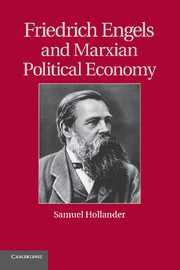Book contents
- Frontmatter
- Contents
- Preface
- Prolegomena
- 1 Engels's Early Contribution
- 2 The Surplus-Value Doctrine, Rodbertus's Charge of Plagiarism, and the Transformation
- 3 Economic Organization, and the Price Mechanism
- 4 “Revisionism” I. Constitutional Reform versus Revolution
- 5 “Revisionism” II. Social Reform
- 6 The Engels–Marx Relation
- 7 A Methodological Overview
- Epilogue: The Immediate Legacy
- Appendix A Prolegomena: A Brief Chronology
- Appendix B Chapter 5
- Appendix C Chapter 7
- Bibliography of Works Cited
- Index
- Titles in the series
3 - Economic Organization, and the Price Mechanism
Published online by Cambridge University Press: 01 June 2011
- Frontmatter
- Contents
- Preface
- Prolegomena
- 1 Engels's Early Contribution
- 2 The Surplus-Value Doctrine, Rodbertus's Charge of Plagiarism, and the Transformation
- 3 Economic Organization, and the Price Mechanism
- 4 “Revisionism” I. Constitutional Reform versus Revolution
- 5 “Revisionism” II. Social Reform
- 6 The Engels–Marx Relation
- 7 A Methodological Overview
- Epilogue: The Immediate Legacy
- Appendix A Prolegomena: A Brief Chronology
- Appendix B Chapter 5
- Appendix C Chapter 7
- Bibliography of Works Cited
- Index
- Titles in the series
Summary
Introduction
Engels's appreciation of the allocative function of prices in competitive capitalism is demonstrated in the first three substantive sections below. The first establishes the general principles adopted; the second takes account of applications made of the competitive pricing model to housing and credit policy (and also his orthodox approach toward foreign-trade policy); and the third concerns the hostile response made to the “communist” proposals by Karl Rodbertus (1842 and 1851). The documents upon which I draw date to the 1870s, and they reveal a distinct contrast with the position of the early 1840s when Engels emphasized the instability of the market process rather than the equilibrating function of prices (see Chapter One, pp. 30–1).
I turn in Section E to Engels's position on communist organization, drawing on the early writings of 1843–4, including the Outlines (reinforcing the claims of priority over Marx made on his behalf in Chapter 1); on Anti-Dühring in 1878; and on later formal and informal statements. Here I seek to appreciate Engels's championship of a control system notwithstanding his high respect for the allocative role of markets in a private-property system. Rodbertus's scheme, Engels charged, had improperly neglected to allow for competition notwithstanding its retention of several features of a market system, whereas the reconstructed system he himself had in mind would be one so greatly simplified that a sophisticated allocation mechanism was not required.
- Type
- Chapter
- Information
- Friedrich Engels and Marxian Political Economy , pp. 125 - 175Publisher: Cambridge University PressPrint publication year: 2011



